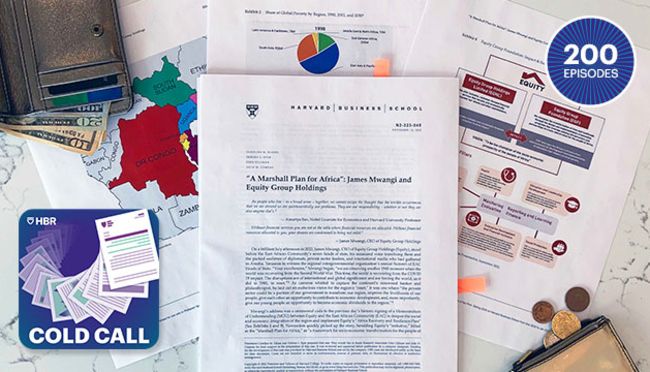Equity →
→

- 27 Apr 2023
- Cold Call Podcast
Equity Bank CEO James Mwangi: Transforming Lives with Access to Credit
James Mwangi, CEO of Equity Bank, has transformed lives and livelihoods throughout East and Central Africa by giving impoverished people access to banking accounts and micro loans. He’s been so successful that in 2020 Forbes coined the term “the Mwangi Model.” But can we really have both purpose and profit in a firm? Harvard Business School professor Caroline Elkins, who has spent decades studying Africa, explores how this model has become one that business leaders are seeking to replicate throughout the world in her case, “A Marshall Plan for Africa': James Mwangi and Equity Group Holdings.” As part of a new first-year MBA course at Harvard Business School, this case examines the central question: what is the social purpose of the firm?

- 18 Apr 2023
- Research & Ideas
The Best Person to Lead Your Company Doesn't Work There—Yet
Recruiting new executive talent to revive portfolio companies has helped private equity funds outperform major stock indexes, says research by Paul Gompers. Why don't more public companies go beyond their senior executives when looking for top leaders?

- 13 Dec 2022
- Research & Ideas
The Color of Private Equity: Quantifying the Bias Black Investors Face
Prejudice persists in private equity, despite efforts to expand racial diversity in finance. Research by Josh Lerner sizes up the fundraising challenges and performance double standards that Black and Hispanic investors confront while trying to support other ventures—often minority-owned businesses.

- 30 Nov 2020
- Working Paper Summaries
Short-Termism, Shareholder Payouts, and Investment in the EU
Shareholder-driven “short-termism,” as evidenced by increasing payouts to shareholders, is said to impede long-term investment in EU public firms. But a deep dive into the data reveals a different story.

- 16 Nov 2020
- Working Paper Summaries
Private Equity and COVID-19
Private equity investors are seeking new investments despite the pandemic. This study shows they are prioritizing revenue growth for value creation, giving larger equity stakes to management teams, and targeting somewhat lower returns.

- 13 Nov 2020
- Working Paper Summaries
Long-Run Returns to Impact Investing in Emerging Markets and Developing Economies
Examination of every equity investment made by the International Finance Corporation, one of the largest and longest-operating impact investors, shows this portfolio has outperformed the S&P 500 by 15 percent.

- 13 Jan 2020
- Research & Ideas
Do Private Equity Buyouts Get a Bad Rap?
Elizabeth Warren calls private equity buyouts "Wall Street looting," but a recent study by Josh Lerner and colleagues shows they have both positive and negative impacts. Open for comment; 0 Comments.

- 05 Nov 2019
- Working Paper Summaries
The Economic Effects of Private Equity Buyouts
Private equity buyouts are a major financial enterprise that critics see as dominated by rent-seeking activities with little in the way of societal benefits. This study of 6,000 US buyouts between 1980 and 2013 finds that the real side effects of buyouts on target firms and their workers vary greatly by deal type and market conditions.

- 16 Oct 2019
- Working Paper Summaries
Core Earnings? New Data and Evidence
Using a novel dataset of earnings-related disclosures embedded in the 10-Ks, this paper shows how detailed financial statement analysis can produce a measure of core earnings that is more persistent than traditional earnings measures and forecasts future performance. Analysts and market participants are slow to appreciate the importance of transitory earnings.

- 19 Nov 2018
- Working Paper Summaries
Lazy Prices
The most comprehensive information windows that firms provide to the markets—in the form of their mandated annual and quarterly filings—have changed dramatically over time, becoming significantly longer and more complex. When firms break from their routine phrasing and content, this action contains rich information for future firm stock returns and outcomes.

- 04 Sep 2018
- Working Paper Summaries
Investing Outside the Box: Evidence from Alternative Vehicles in Private Capital
Private equity vehicles that differ from the traditional structure have become a major portion of investors’ portfolios, especially over the past decade. This study identifies differences in performance across limited and general partners participating in such vehicles, as well as across the two broad classes of alternative vehicles.

- 29 Aug 2018
- Working Paper Summaries
How Much Does Your Boss Make? The Effects of Salary Comparisons
This study of more than 2,000 employees at a multibillion dollar firm explores how perceptions about peers’ and managers’ salaries affect employee behaviors and preferences for equity. Employees exhibit a high tolerance for inequality when job titles differ, which may explain why incentives are granted through promotions, and gender pay differences are most pronounced across positions.

- 12 Feb 2018
- Working Paper Summaries
Private Equity, Jobs, and Productivity: Reply to Ayash and Rastad
In 2014, the authors published an influential analysis of private equity buyouts in the American Economic Review. Recently, economists Brian Ayash and Mahdi Rastad have challenged the accuracy of those findings. This new paper responds point by point to their critique, contending that it reflects a misunderstanding of the data and methodology behind the original study.

- 19 Sep 2017
- Working Paper Summaries
An Invitation to Market Design
Effective market design can improve liquidity, efficiency, and equity in markets. This paper illustrates best practices in market design through three examples: the design of medical residency matching programs, a scrip system to allocate food donations to food banks, and the recent “Incentive Auction” that reallocated wireless spectrum from television broadcasters to telecoms.

- 28 Aug 2017
- Research & Ideas
Should Industry Competitors Cooperate More to Solve World Problems?
George Serafeim has a theory that if industry competitors collaborated more, big world problems could start to be addressed. Is that even possible in a market economy? Open for comment; 0 Comments.

- 04 Aug 2017
- Working Paper Summaries
Private Equity and Financial Fragility During the Crisis
Examining the activity of almost 500 private equity-backed companies during the 2008 financial crisis, this study finds that during a time in which capital formation dropped dramatically, PE-backed companies invested more aggressively than peer companies did. Results do not support the hypothesis that private equity contributed to the fragility of the economy during the recent financial crisis.

- 12 May 2017
- Working Paper Summaries
Equality and Equity in Compensation
Why do some firms such as technology startups offer the same equity compensation packages to all new employees despite very different cash salaries? This paper presents evidence that workers dislike inequality in equity compensation more than salary compensation because of the perceived scarcity of equity.

- 03 May 2016
- Working Paper Summaries
Pay Now or Pay Later? The Economics within the Private Equity Partnership
Partnerships are essential to the professional service and investment sectors. Yet the partnership structure raises issues including intergenerational continuity. This study of more than 700 private equity partnerships finds 1) the allocation of fund economics is typically weighted toward the founders of the firms, 2) the distributions of carried interest and ownership substantially affect the stability of the partnership, and 3) partners’ departures have a negative effect on private equity groups’ ability to raise additional funds.

- 15 Feb 2016
- Working Paper Summaries
Replicating Private Equity with Value Investing, Homemade Leverage, and Hold-to-Maturity Accounting
This paper studies the asset selection of private equity investors and the risk and return properties of passive portfolios with similarly selected investments in publicly traded securities. Results indicate that sophisticated institutional investors appear to significantly overpay for the portfolio management services associated with private equity investments.

When Does Impact Investing Make the Biggest Impact?
More investors want to back businesses that contribute to social change, but are impact funds the only approach? Research by Shawn Cole, Leslie Jeng, Josh Lerner, Natalia Rigol, and Benjamin Roth challenges long-held assumptions about impact investing and reveals where such funds make the biggest difference.